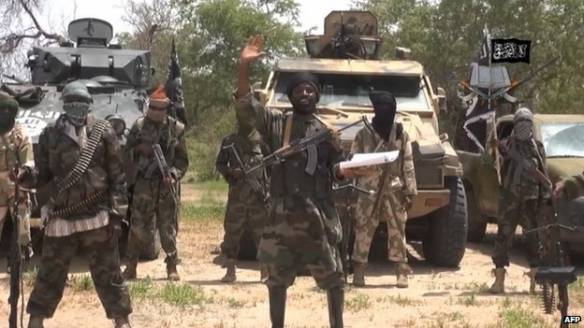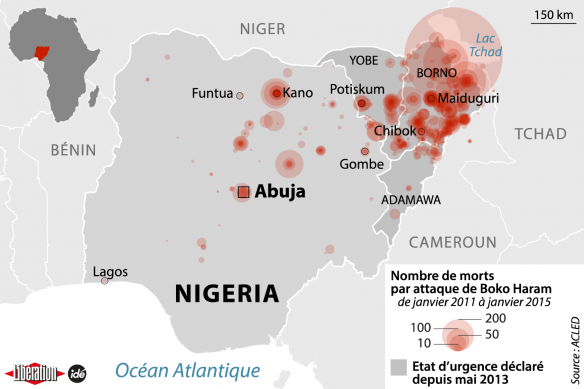Boko Haram’s influence and cruelty is still increasing. On the 3rd of January the Islamist group first attacked Baga, situated at the riverside of Lake Chad in the north of the State of Borno. They then came back several days later and demolished the entire city and its surrounding villages. The attack reportedly caused more than 2000 victims, although the numbers are not verifiable. The Nigerian army considers it as the most deadly attack since the beginning of the Islamist insurrection in 2009, so fare causing more than 13 000 causalities.
Marc-Antoine Pérouse de Montclos, specialist on Nigeria, and PRIO Global Fellow, analyses the multiplication and intensification of the Islamist group’s deadly attacks at the outset of this year in this interview by Jean-Louis le Touzet.

Boko Haram. Photo: Africa – News and Analysis
An attack on Saturday 10 January particularly affected the population in Maiduguri; a bomb attached to a 10-year old girl killed at least 19 people. Specialist on Nigeria and researcher at the Development Research Institute, Marc-Antoine Pérouse de Montclos, discusses the central state´s incapacity to contain the attacks in the North-East and to protect its own population, just as the presidential elections are to take place in mid-February in the most populated country in Africa.
Mass crimes in the area around the Lake Chad, repeated attacks in Cameroon; has the threat become international?
At the Peace and Security Forum of the African Union in Dakar in mid-December, the interventions were marked by the idea that all jihadists are the same. Following this logic, there would be only one international jihadist organization going from Al-Shebab in Somalia to IS in Iraq and Syria to Boko Haram and finally AQIM and Mujao in Mali. I do not agree with this analysis because it totally ignores the local dynamics. It’s a form of reasoning based on the domino theory meaning that if one country falls, the others will automatically follow. Thus Nigeria would soon fall. But Boko Haram does not have the fire power that the Islamic State (IS) has. No matter how horrible and numerous these attacks are, they are perpetrated with ridiculous means. When they attack villages in Cameroon they are three on a motorcycle, one driver, one henchman and one shooter. Or they may use minibuses and 4WD, stolen in Nigeria. They very seldom use armoured vehicles seized from the Nigerian army. Despite the high number of victims, Boko Haram does not have IS’ organisational skills.
This confusion scares me because the reactions I got at the Dakar Forum would lead to increased militarisation on the grounds that Boko Haram has become an international issue and needs to be addressed accordingly. Nigerians therefore urge for a United Nations resolution in order to mobilise a force of 2 800 men, composed of the armies of Chad, Cameroon and of course Nigeria. In this manner they imagine they can overcome structural factors such as corruption, which explains why the better-equipped army does not manage to contain the advancement of Boko Haram.

Why does this establishment of a cross-border force, which already exists through the Multinational Joint Task Force, worry you?
An army of troopers already exists and it is not able to win an asymmetric war against an invisible enemy because it has behaved so poorly that the population refuses to cooperate. This lack of support from the local population is explained by the fact that the Nigerian army has raped, killed and massacred civilians and that they do not protect the villagers when they are under attack by Boko Haram and are crying for help. And all of a sudden we are supposed to believe that more troopers on the ground would be the solution. I especially have in mind the inacceptable behaviour of the Chadian troops in Central Africa.
Is this a worrying sign to you?
Yes, indeed, because this internationalisation of the response is based on an exaggerated vision of a globalized threat which the jihadist groups in the Sahel region represent. These groups are supposedly one, all linked together and consulting each other under the aegis of an imaginary central command in the south of Libya, whose only task would be to press a button ordering the Shebab in Somalia to attack Kampala in Uganda, or Boko Haram to invade the federal capital Abuja. I think we have here interpretations which project us towards a self-fulfilling prophecy.
Yet, Boko Haram is now attacking Cameroon?
The more one internationalises the response, the more one internationalises Boko Haram, who contrary to Al-Shebab, does not have operational links neither to Al-Qaida, nor to an overseas diaspora. But as a result of internationalising the response, we may end up seeing such links appear, which did not exist previously…
Can we speak of a desegregation of the Nigerian State?
I do not think so. Certainly three out of thirty-six states are totally dysfunctional.
There is above all this electoral rule according to which the elected president has to obtain 25 % of the votes in two thirds of the states. But in the three north-eastern states the elections cannot take place. It is de facto a juridical gap. According to the law a person can only vote where he is registered, but there are 1.5 million displaced persons within Nigeria´s borders. They cannot vote. The electoral commission has proposed an amendment to this electoral law in order to exceptionally authorise the displaced to vote. But the Parliament has not responded. At the time of the previous elections the results were contested. In this area I am not even sure if the electoral commission will be able to pronounce a result. Hence the hypothesis of an intermediate government ruled by the president of the Senate or a delay in the elections. But that would not be in Goodluck Jonathan’s interest because his popularity is falling and he wants to be re-elected as soon as possible.
Does the conquest of the Baga garrison indicate the establishment of a caliphate?
At the time being I do not think so. But the only question is the following: Are they capable of holding a garrison? If yes, for how long? And, are they still there? If they still hold it in one month’s time, then yes, it would be a turning point, a true symbol. In December 2013 the air base of Maiduguri was conquered for seven hours, just enough time to set the airplanes on fire. It is a fact, at the time being they do not hold ground. They would like to copy IS, but the Nigerian air force has chased them each time. Boko Haram has lost several combatants and they have withdrawn. As a consequence, they have returned to this mobility war. They hold some localities, but it is by default and in the absence of troops in these areas.
Originally published in French in Libération 14 January.
Translation from French: Ingjerd Terese Skaug Robin
Very interesting effort. I am of the view that the Nigerian state is not willing to fight Boko Haram, but it has all it takes to fight the Boko Haram. What is the population of Boko Haram compared to Nigerian Army? What is the level of their training?